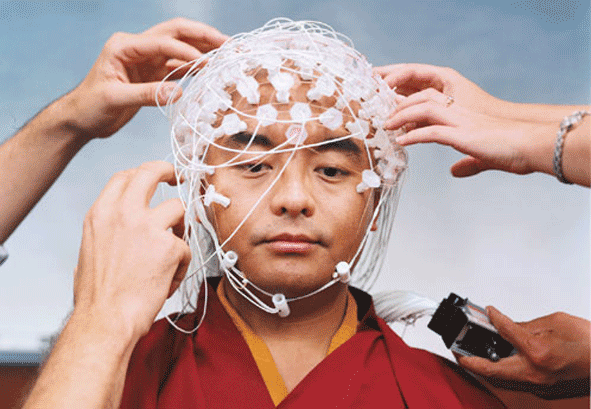11 Science-Proven Benefits of Mindfulness-Awareness Meditation
The popularity of mindfulness-awareness meditation – effortless presence – is increasing as more and more people discover its benefits. People generally begin a dedicated daily practice of meditation to reduce stress, develop concentration, and increase awareness of what is happening in the moment.
People also find that a strong foundation in mindfulness-awareness meditation leads one to live from genuineness, confidence, humor, and dignity within the complexity of daily life.
Below, you will find studies supporting each of the benefits of mindfulness-awareness meditation.
1. Meditation Reduces Stress
Stress reduction is one of the most common reasons that people begin a dedicated daily practice of meditation.
One study involving over 3,500 adults showed that it lives up to its reputation for stress reduction.
Normally, mental and physical stress cause increased levels of the stress hormone cortisol. This produces many of the harmful effects of stress, such as the release of inflammation-promoting chemicals called cytokines. These effects can disrupt sleep, promote depression and anxiety, increase blood pressure and contribute to fatigue and cloudy thinking. In an eight-week study, meditation reduced the inflammation response caused by stress.
Another study of nearly 1,300 adults demonstrated that meditation may decrease stress. Notably, this effect was strongest in individuals with the highest levels of stress.
Research has shown that meditation may also improve symptoms of stress-related conditions, including irritable bowel syndrome, post-traumatic stress disorder and fibromyalgia.
SUMMARY:
Meditation can help reduce stress and symptoms in people with stress-triggered medical conditions.
2. Meditation Helps Control Anxiety
Less stress translates to less anxiety.
For example, an eight-week study of meditation helped participants reduce their anxiety. It also reduced symptoms of anxiety disorders, such as phobias, social anxiety, paranoid thoughts, obsessive-compulsive behaviors and panic attacks.
Another study followed up with 18 volunteers three years after they had completed an eight-week meditation program. Most volunteers had continued practicing regular meditation and maintained lower anxiety levels over the long-term.
A larger study of 2,466 participants also showed that a variety of different meditation strategies may reduce anxiety levels. For example, yoga has been shown to help people reduce anxiety. This is likely due to benefits from both meditative practice and physical activity.
Meditation may also help control job-related anxiety in high-pressure work environments. One study found that a meditation program reduced anxiety in a group of nurses.
SUMMARY:
A regular daily practice of meditation helps reduce anxiety and anxiety-related mental health issues like social anxiety, phobias and obsessive-compulsive behaviors.
3. Meditation Promotes Emotional Health
Meditation can also lead to an improved self-image and more positive outlook on life.
Two studies of meditation found decreased depression in over 4,600 adults.
One study followed 18 volunteers as they practiced meditation over three years. The study found that participants experienced long-term decreases in depression.
Inflammatory chemicals called cytokines, which are released in response to stress, can affect mood, leading to depression. A review of several studies suggests meditation may reduce depression by decreasing these inflammatory chemicals.
Another controlled study compared electrical activity between the brains of people who practiced meditation and the brains of others who did not. Those who meditated showed measurable changes in activity in areas related to positive thinking and optimism.
SUMMARY:
Meditation can improve depression and create a more positive outlook on life. Research shows that maintaining an ongoing daily practice of meditation may help you maintain these benefits long term.
4. Meditation Enhances Self-Awareness
Meditation may help you develop a stronger understanding of yourself and how you relate to those around you, thus helping you grow into your best self.
Meditation also teaches you to recognize thoughts that may be harmful or self-defeating. The idea is that as you gain greater awareness of your thought habits, you can steer them toward more constructive patterns.
In one study, 40 senior men and women who took a meditation program experienced reduced feelings of loneliness, compared to a control group that had been placed on a wait list for the program.
Also, experience in meditation may cultivate more creative problem solving.
SUMMARY:
Meditation can help you “know yourself.” This can be a starting point for making other positive changes.
5. Meditation Lengthens Attention Span
Meditation is like weight-lifting for your attention span. It helps increase the strength and endurance of your attention and awareness.
For example, a study looked at the effects of an eight-week meditation course and found it improved participants’ ability to reorient and maintain their attention.
A similar study showed that human resource workers who regularly practiced meditation stayed focused on a task for longer. These workers also remembered details of their tasks better than their peers who did not practice meditation.
Moreover, one review concluded that meditation may even reverse patterns in the brain that contribute to mind-wandering, worrying and poor attention.
Beneficial results appear within the first week of a regular daily practice of meditation. One study found that after only four days of practicing meditation an increase in attention span was experienced.
SUMMARY:
Meditation may build your ability to redirect and maintain attention. As little as four days of meditation may have an effect but, of course, to continue the effects, one must continue to meditate.
6. Meditation May Reduce Age-Related Memory Loss
Improvements in attention and clarity of thinking may help keep your mind young.
Meditation that includes a repeated mantra (short chant) and mudra (hand gesture) improved participants’ ability to perform memory tasks in multiple studies of age-related memory loss.
Furthermore, a review of 12 studies found that meditation increased attention, memory and mental quickness in older volunteers.
In addition to fighting normal age-related memory loss, meditation can at least partially improve memory in patients with dementia. It can also help control stress and improve coping in those caring for family members with dementia.
SUMMARY:
The improved focus you can gain through regular meditation may increase memory and mental clarity. These benefits can help fight age-related memory loss and dementia.
7. Meditation May Help Fight Addictions
The mental discipline you can develop through meditation may help you break dependencies by increasing your self-control and awareness of triggers for addictive behaviors.
Research has shown that meditation may help people learn to redirect their attention, increase their willpower, control their emotions and impulses and increase their understanding of the causes behind their addictive behaviors.
One study that taught 19 recovering alcoholics how to meditate found that participants who received the training got better at controlling their cravings and craving-related stress.
Meditation may also help you control food cravings. A review of 14 studies found meditation helped participants reduce emotional and binge eating.
SUMMARY:
Meditation develops mental discipline and willpower and can help you avoid triggers for unwanted impulses. This can help you recover from addiction, lose weight and redirect other unwanted habits.
8. Meditation Improves Sleep
Nearly half the population will struggle with insomnia at some point.
One study compared two meditation programs by randomly assigning participants to one of two groups. One group practiced meditation, while the other didn’t. Participants who meditated fell asleep sooner and stayed asleep longer, compared to those who didn’t meditate.
SUMMARY:
Becoming skilled in meditation may help you control or redirect the racing or “runaway” thoughts that often lead to insomnia. Additionally, it can help relax your body, releasing tension and placing you in a peaceful state in which you’re more likely to fall asleep.
9. Meditation Helps Control Pain
Your perception of pain is connected to your state of mind, and it can be elevated in stressful conditions.
For example, one study used functional MRI techniques to observe brain activity as participants experienced a painful stimulus. Some participants had gone through four days of meditation training, while others had not. The meditating patients showed increased activity in the brain centers known to control pain. They also reported less sensitivity to pain.
One larger study looked at the effects of a regular daily practice of meditation in 3,500 participants. It found that meditation was associated with decreased complaints of chronic or intermittent pain.
An additional study of meditation in patients with terminal diseases found meditation may help mitigate chronic pain at the end of life.
In each of these scenarios, meditators and non-meditators experienced the same causes of pain, but meditators showed a greater ability to cope with pain and even experienced a reduced sensation of pain.
SUMMARY:
Meditation can diminish the perception of pain in the brain. This may help treat chronic pain when used as a supplement to medical care or physical therapy.
10. Meditation Can Decrease Blood Pressure
Meditation can also improve physical health by reducing strain on the heart. Over time, high blood pressure makes the heart work harder to pump blood, which can lead to poor heart function. High blood pressure also contributes to atherosclerosis, or narrowing of the arteries, which can lead to heart attacks and strokes.
A study of 996 volunteers found that when they meditated they experienced reduced blood pressure by about five points, on average. This was more effective among older volunteers and those who had higher blood pressure prior to the study.
In part, meditation appears to control blood pressure by relaxing the nerve signals that coordinate heart function, tension in blood vessels and the “fight-or-flight” response that increases alertness in stressful situations.
SUMMARY:
Blood pressure decreases not only during meditation, but also over time in individuals who meditate regularly. This can reduce strain on the heart and arteries, helping prevent heart disease.
11. You Can Meditate Anytime Anywhere
You can practice meditation in line at the market or walking down the sidewalk or out in nature. For a formal practice of meditation, you can do it with as little as five minutes daily. The longer or more frequently you practice, the stronger the benefit.
If your regular work and home environments do not allow for consistent, quiet alone time, consider participating in a class or group. This can also improve your chances of success by providing a supportive community.
Alternatively, consider setting your alarm a few minutes early to take advantage of quiet time in the morning. This may help you develop a consistent habit and allow you to start the day positively.
SUMMARY:
If you’re interested in incorporating meditation into your daily routine, seek out in-person instruction from a live experienced teacher of traditional mindfulness-awareness meditation. There is no substitute.

